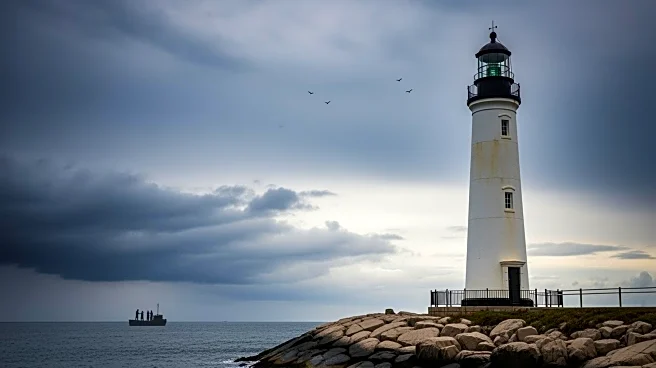What's Happening?
Germany is facing potential delays in tightening its laws to prosecute small-boat smugglers, a move initially planned to be completed by the end of 2025. The German Interior Ministry has indicated that
while the bill will be introduced to the Bundestag, there is no guaranteed timeline for its final approval. This legislative change aims to close a loophole that currently does not make facilitating people-smuggling to third countries, such as the UK, explicitly illegal. The delay comes amid France's retreat from a commitment to more forcefully intercept migrant boats at sea. The UK's Labour government, under pressure to demonstrate effective international collaboration, views Germany's legislative change as crucial to tackling illegal Channel crossings. A BBC investigation previously revealed Germany's role as a hub for storing dinghies used in these crossings, prompting Berlin's commitment to adapt its laws.
Why It's Important?
The delay in Germany's legislative process could have significant implications for the UK's efforts to combat illegal migration across the English Channel. The UK government has been advocating for stronger international cooperation to address the issue, and Germany's commitment was seen as a key component of this strategy. Any postponement in enacting the law could hinder the UK's ability to 'smash the gangs' involved in people-smuggling, as promised by UK Prime Minister Sir Keir Starmer. The situation also highlights the complexities of international legal frameworks and the challenges of aligning policies across borders to effectively manage migration issues.
What's Next?
The German Interior Ministry has yet to confirm when the proposed law will be approved by the Cabinet, a necessary step before it can be presented to the Bundestag. The UK government is likely to continue pressing Germany for timely action, while also exploring other international partnerships to strengthen its border enforcement. The outcome of this legislative process will be closely monitored by both UK and German officials, as well as other European countries facing similar migration challenges.
Beyond the Headlines
The delay in Germany's legislative action underscores the broader issue of how European countries manage migration and the legal complexities involved in cross-border enforcement. It also raises questions about the effectiveness of international treaties and agreements in addressing such transnational issues. The situation may prompt further discussions on the need for a more unified European approach to migration and border security.










